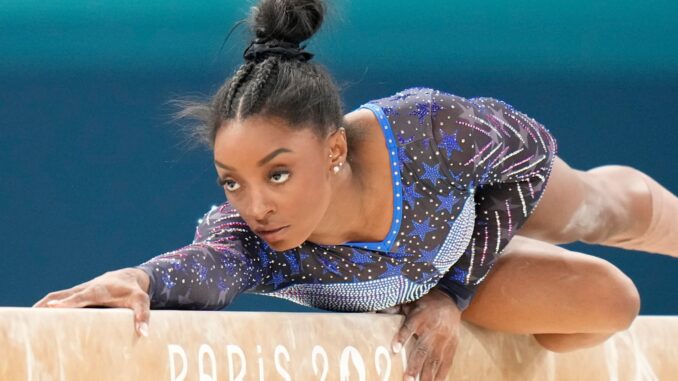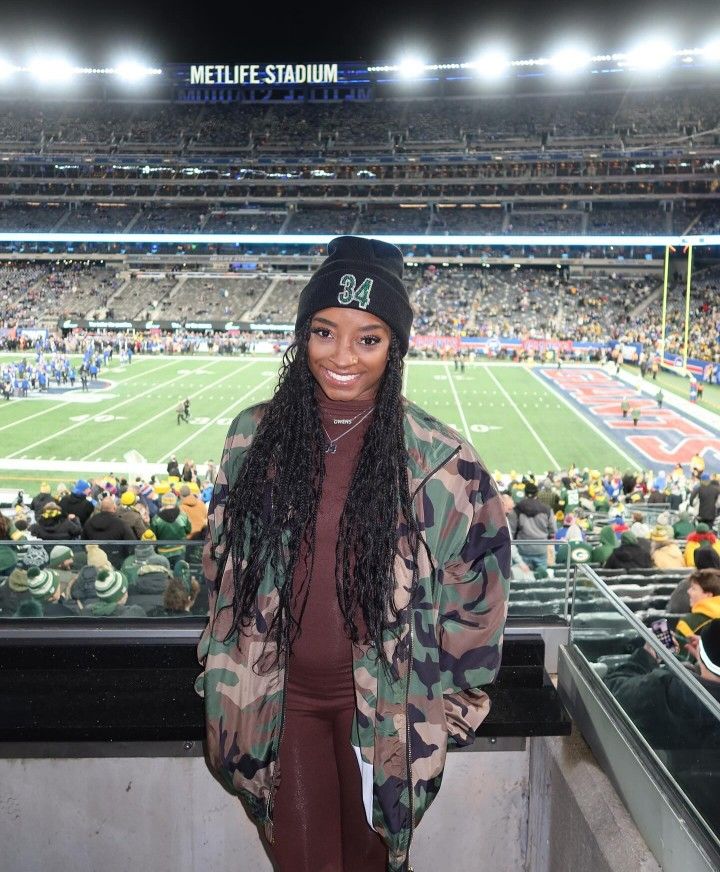
Tensions are rising online between Simone Biles and Riley Gaines. On June 6, the Olympic gymnast and the former swimmer began feuding on social media over disagreements on transgender athletes’ participation in sports. After Gaines made anti-trans remarks about a transgender softball player while commenting on a celebratory post from the Minnesota State High School League, Biles called her a “sore loser” and accused her of being a “bully.” The heated exchange comes amid ongoing national debate, as the Trump administration pushes back against states that allow transgender athletes to participate in sports that align with their gender identity.
Just one week before Biles and Gaines’ online feud began, the administration threatened California with fines and legal action after a 16-year-old transgender athlete, AB Hernandez, won both the girls’ high jump and triple jump at a state track meet, according to CBS News. Following Hernandez’s victories during qualifying events, the California Interscholastic Federation updated its rules to allow more “biological female student-athletes” to enter events that transgender athletes are also competing in, per AP News. So, why are Simone Biles and Riley Gaines feuding? Here’s everything to know about what led to their heated online exchanges.
Who is Riley Gaines? Gaines, a former swimmer, is a conservative activist who has notoriously campaigned against the participation of trans women in women’s sports. According to her website, the University of Kentucky alum describes herself as “a leader defending women’s single-sex spaces, advocating for equality and fairness, and standing up for women’s safety, privacy, and equal opportunities.” She is also the host of OutKick’s Gaines for Girls podcast.
Why are Simone Biles and Riley Gaines feuding?
The athletes began clashing online on June 6 after Gaines made an anti-trans comment on a post from the Minnesota State High School League, which celebrated its first softball state championship win. “Comments off, lol. To be expected when your star player is a boy,” Gaines replied to the league’s post on X. According to Fox News, she was referring to Marissa Rothenberger, a transgender athlete who is a pitcher for the team. Rothenberger helped secure the win by pitching a shutout, as their opponents failed to score any runs.
The Olympic medalist then replied to Gaines’ post on X, calling her a “straight up sore loser” and “bully.” “You’re truly sick, all of this campaigning because you lost a race,” Biles wrote. “You should be uplifting the trans community and perhaps finding a way to make sports inclusive OR creating a new avenue where trans feel safe in sports. Maybe a transgender category IN ALL sports!!” She continued, “But instead… You bully them… One things for sure is no one in sports is safe with you around!!!!!”
In recent weeks, the sports world has been rocked by a high-profile feud between Olympic gymnast Simone Biles and former NCAA swimmer Riley Gaines. Their disagreement centers on the inclusion of transgender athletes in women’s sports—a topic that has sparked intense debate across the United States. Let’s delve into the origins of their conflict, the key issues at stake, and the broader implications for the future of sports.
The Spark: A Controversial Social Media Exchange
The tension between Biles and Gaines ignited on June 6, 2025, when Gaines criticized a Minnesota high school girls’ softball team for allowing a transgender pitcher to compete. She argued that the inclusion of transgender athletes in women’s sports undermines fairness and erodes the achievements of cisgender women.
Biles, a vocal advocate for LGBTQ+ rights, swiftly responded on social media, condemning Gaines’ remarks as harmful and divisive. She emphasized the importance of inclusivity and fairness in sports, suggesting that the solution might lie in creating separate categories for transgender athletes.
Escalation: Personal Attacks and Public Apologies
The online exchange quickly escalated, with Biles making comments about Gaines’ appearance that many perceived as mocking. This led to widespread criticism of Biles for resorting to personal attacks instead of focusing on the issue at hand. Recognizing the need to de-escalate the situation, Biles issued a public apology on June 10, 2025. She clarified that her intent was never to support unfair exclusion but to address the complexities of fairness and inclusivity in sports with empathy and respect. Gaines accepted the apology but reiterated her stance against the participation of transgender athletes in women’s sports, maintaining that such inclusion compromises the integrity of female athletics.

The Core Issue: Fairness vs. Inclusion
At the heart of the Biles-Gaines feud lies a fundamental debate: how can sports balance fairness and inclusion? Advocates for transgender inclusion argue that sports should be accessible to all, regardless of gender identity, and that exclusionary policies are discriminatory.
Conversely, critics like Gaines contend that allowing transgender women to compete in women’s events creates an uneven playing field, disadvantaging cisgender women. They believe that biological differences provide transgender athletes with inherent advantages, particularly in strength and endurance.
Public Reactions and Media Coverage
The feud has garnered significant media attention, with outlets like The Advocate and People providing extensive coverage. Public reactions have been mixed, with some supporting Biles’ call for inclusivity and others backing Gaines’ concerns about fairness. Former ESPN and FS1 analyst Katie Nolan criticized Gaines for her stance, accusing her of bullying transgender youth. In response, Gaines dismissed Nolan’s comments, stating she sleeps “easily and peacefully” despite the criticism.
Broader Implications for Sports Policy
The Biles-Gaines feud is part of a larger national conversation about transgender rights in sports. Several states have enacted laws banning transgender athletes from competing in women’s sports, while others have proposed creating separate categories for transgender competitors. The NCAA and other sports organizations face increasing pressure to address these issues, balancing the need for fair competition with the rights of transgender athletes. The outcome of this debate will likely set precedents for how sports organizations handle gender inclusion in the future.
Conclusion: A Complex and Ongoing Debate
The disagreement between Simone Biles and Riley Gaines underscores the complexities of balancing fairness and inclusion in sports. While both women are passionate advocates for their respective causes, their feud highlights the challenges in finding common ground on this contentious issue.
As the debate continues, it’s crucial to approach the topic with empathy and respect for all athletes, recognizing the diverse perspectives and experiences that shape their views. Only through open dialogue and thoughtful consideration can a fair and inclusive path forward be found.